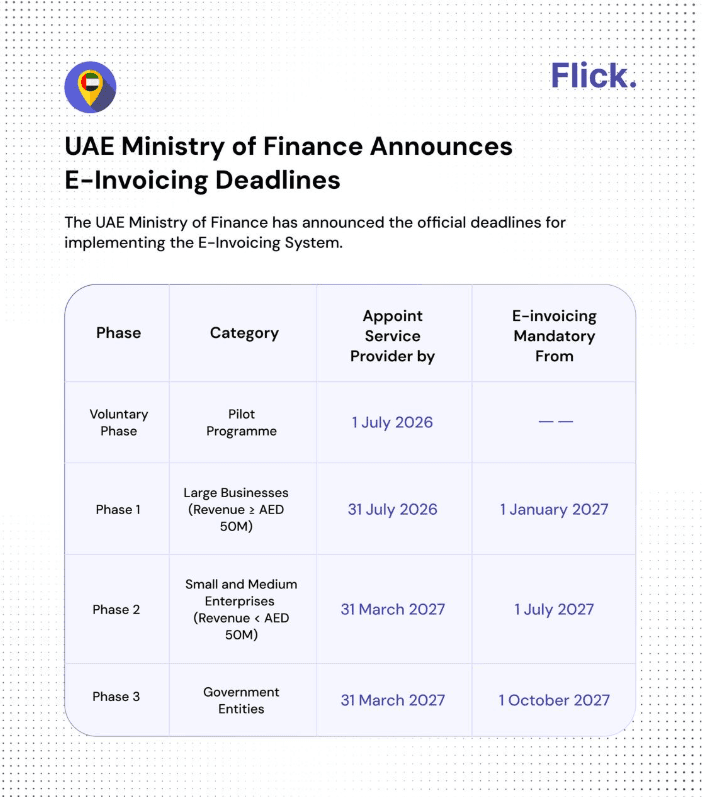E-invoicing in UAE
Transform Your Financial Management with e-Invoicing in UAE
Our Products:
UAE E-Invoicing 2025: Scope, Exclusions & Phased Implementation
Last updated at
December 5, 2025
Book a Demo
Learn more about this by booking a demo call with us. Our team will guide you through the process and answer any questions you may have.
Book NowUAE E-Invoicing 2025: Scope, Exclusions & Phased Implementation
On 29 September 2025, the Ministry of Finance of the United Arab Emirates issued Ministerial Decision No. 243 of 2025 and Ministerial Decision No. 244 of 2025 to set the scope, the obligations, and the phased implementation of the E-Invoicing System in UAE. In this blog, we will explain all the important points that are included in these two Ministerial Decisions.
What is E-Invoicing in the UAE?
E-Invoicing is the issuing, transmitting, and receiving of invoices and credit note data in a structured electronic format that allows automatic electronic processing. PDF or paper invoices are not considered valid e-invoices under the E-Invoicing System.
Scope of E-Invoicing in the UAE
The Ministry of Finance has announced the scope of the E-Invoicing System to clarify which businesses and transactions will be covered:
- All businesses in the UAE that are engaging in B2B (business-to-business) and B2G (business-to-government) transactions will come under the E-Invoicing System, unless they are specifically excluded.
- B2C (business-to-consumer) transactions are not included in the mandatory scope at this stage, so businesses that deal only with consumers will not be required to issue e-invoices for now.
Exclusions from E-Invoicing in UAE
Some transactions and persons will not be covered by the E-Invoicing System at this stage:
- Government Entities carrying out activities in a sovereign capacity which are not in competition with the private sector.
- International passenger transport services by airlines where an electronic ticket is issued to passengers.
- Ancillary airline services provided directly to passengers where an electronic miscellaneous document is issued.
- International transport of goods by airlines where an airway bill is issued. This exclusion will apply only for a period of twenty-four months from the date the system becomes effective.
- Financial services that are exempt from VAT or that are subject to VAT at the zero rate.
- Any other transactions or persons that may be excluded by a future decision of the Minister.
Implementation of E-Invoicing in UAE
The Ministry of Finance has confirmed that the timelines for E-Invoicing in the UAE will be introduced in the following phases:
| Category | Deadline to Appoint Accredited Service Provider | Date of Mandatory Implementation
|
| Pilot Programme | Selected taxpayers invited by MoF and FTA | Starts on 1 July 2026 |
| Large Businesses – revenue of AED 50M or more | By 31 July 2026
| From 1 January 2027
|
Small and Medium Businesses – revenue of less than AED 50M
| By 31 March 2027
| From 1 July 2027
|
Government Entities
| By 31 March 2027 | From 1 October 2027
|

Requirements in the E-Invoicing System in UAE
The Ministry of Finance has outlined the requirements that every business must follow under the E-Invoicing System:
- All invoices and credit notes must be issued, transmitted, received, and processed in a structured electronic format that allows automatic electronic processing.
- Every business issuing and receiving invoices must appoint an Accredited Service Provider approved by the Federal Tax Authority. The list of accredited providers will be published by the Ministry.
- An e-invoice or a credit note must be issued and transmitted within 14 days from the date of the business transaction and both the issuer and the recipient must process it through the system and report it to the FTA within the timeline set by the Ministry.
- A credit note must be issued in the following cases:
- When a transaction is cancelled
- When goods or services are returned
- When the value of a supply is reduced
- When there is an error in the invoice
- Each e-invoice and credit note must include all of the data fields and details prescribed by the Ministry of Finance.
- An agent may issue an invoice or a credit note on behalf of a principal and self-billing is allowed if the conditions under the VAT rules are met.
- All invoices, credit notes, and related records must be stored within the UAE, in line with the retention rules of the Tax Procedures Law.
- Any system failure must be reported to the FTA within two business days, following the procedures set by the Authority.
Conclusion
Officially, the Ministry of Finance has announced the deadlines for the phased implementation of the E-Invoicing System in the UAE. Businesses must use this time to prepare for mandatory implementation starting from 1 January 2027, appoint an Accredited Service Provider, and train their teams. For any assistance, you can contact Flick Network at sales@flick.network.
Quick Navigation
Book a Demo
Learn more by booking a demo with our team. We'll guide you step by step.